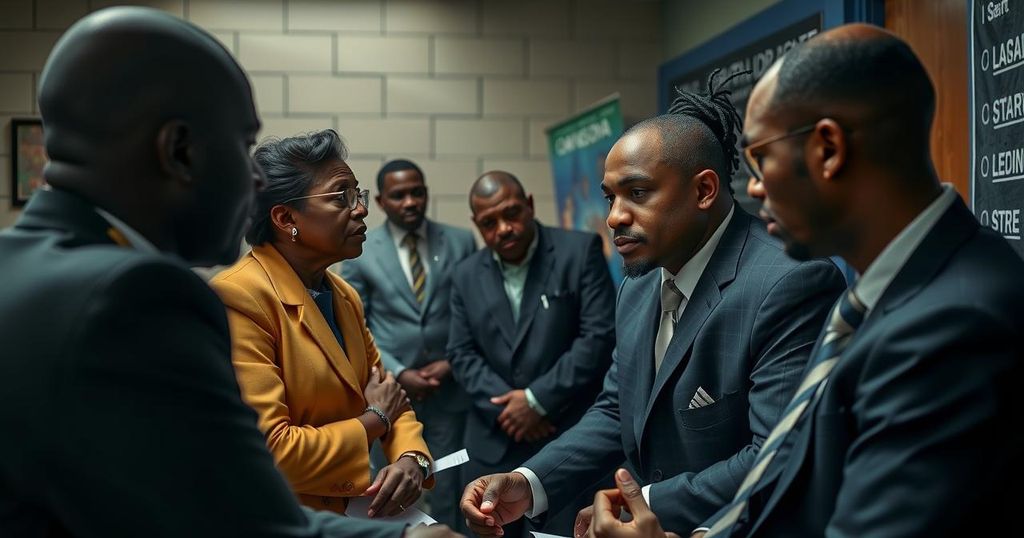Bobi Wine Visits Kizza Besigye in Jail Amidst Political Tensions in Uganda

Bobi Wine, the Opposition leader in Uganda, visited Kizza Besigye in jail, reporting he is in ‘good spirits.’ Wine condemned the Ugandan government’s actions and urged Kenya to prevent future incidents. Ugandan spokesperson Chris Baryomunsi confirmed Kenya’s involvement in Besigye’s arrest, drawing international criticism. Besigye, facing charges in a military court, was remanded until December 2, amidst concerns over transnational repression and civil rights violations.
Bobi Wine, the Opposition leader in Uganda, visited Kizza Besigye at a correctional facility on Friday, where he reported that the detained political figure was in “good spirits.” Following the visit, Wine condemned the actions of the Ugandan government and urged the Kenyan authorities to implement corrective measures to avert similar incidents in the future.
Amidst this diplomatic tension, Chris Baryomunsi, the Ugandan government spokesperson, confirmed that Besigye’s arrest in Kenya occurred with the cooperation of Kenyan authorities. This revelation surfaced just two days after a senior official from Kenya announced an investigation into Besigye’s abduction, which has sparked significant international criticism. Initially, the Kenyan government denied any participation in the arrest of the well-known opposition figure, who has been a long-time critic of President Yoweri Museveni.
Baryomunsi stated that, “without Kenya’s involvement, it would not have been possible for Besigye to cross into Uganda,” underscoring the regular intelligence sharing between the two nations that aids their bilateral relations. Kenya’s foreign ministry’s permanent secretary, Korir Sing’Oei, voiced regret over the situation and confirmed that an official investigation was underway.
Besigye had appeared in a military court on Wednesday, where he faces charges of weapon possession and allegedly seeking foreign support to destabilize Uganda. He denied these accusations, asserting his status as a civilian, unsuitable for military trial, and was subsequently remanded to Luzira prison until December 2.
The Ugandan government defended the legality of Besigye’s arrest by referring to international treaties that facilitate cross-border extraditions. The United Nations Secretary-General’s spokesperson expressed “extreme concern” regarding Besigye’s circumstances. Human rights organizations, including Amnesty International, have condemned the abduction, asserting it is indicative of a broader pattern of transnational repression linked to the recent actions by Kenyan authorities, including the secret deportation of Turkish refugees. Additionally, Uganda has intensified its crackdown on dissent, notably with the deportation and prosecution of 36 members of the Forum for Democratic Change party in July.
The political climate in Uganda has been increasingly tense, particularly regarding the treatment of opposition figures like Kizza Besigye. His arrest in Kenya and subsequent extradition has sparked outrage both domestically and internationally, raising concerns about human rights and the suppression of dissenting voices in the region. This incident has also highlighted the complex relationships and agreements between Uganda and Kenya, especially concerning border security and political cooperation. Such developments are part of a larger narrative of escalating repression against political opposition within Uganda, particularly following the recent deportation of members of the opposition party.
In summary, Bobi Wine’s visit to Kizza Besigye emphasizes the ongoing plight of political opposition in Uganda amidst heightened governmental scrutiny and international concern. The collaborative role of the Kenyan authorities in Besigye’s arrest raises questions about sovereignty and human rights, as reflected in the reactions from international organizations. This incident exemplifies the worrying trend of repression faced by political opponents in the region, necessitating urgent discussions on the protection of civil liberties and political freedoms.
Original Source: newscentral.africa







